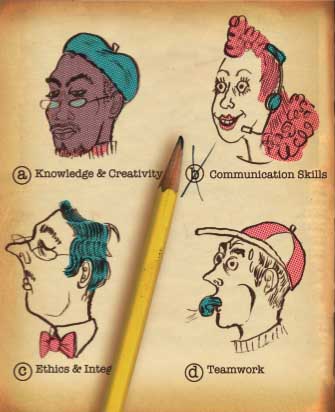
Illustration: Gilbert Ford
The Educational Testing Service (ETS) recently announced “the first large-scale evaluation of personal attributes for use in graduate admissions.” This new test, the Personal Potential Index (PPI), will provide graduate programs with “reliable information about six key personal attributes critical for success in graduate school.” Some attributes are hard to dispute (“Knowledge and Creativity,” “Communication Skills”), although most applicants would lie through their teeth about “Ethics and Integrity.” Two others are questionable. “Teamwork?” For some disciplines “Misanthropy” would be more appropriate. “Planning and Organization?” You want to make the faculty look bad?
Beyond those quibbles, I have a problem that goes back to a 1956 classic, William H. Whyte’s The Organization Man. The book includes an appendix titled “How to Cheat on Personality Tests,” advising would-be successes in the business world to strive for “a score somewhere between the 40th and 60th percentiles” by trying to “answer as if you were like everyone else is supposed to be.” The “personal attributes” tests Whyte wanted to rig assumed a norm as the ideal.
I hope ETS isn’t positing anything the least bit normal about going to graduate school. Look at what it involves. To pick a discipline at random: Future historians spend long hours in musty archives, drudging their way through incomplete documents in illegible handwriting. That’s the fun part. Whatever the field may be, engaging in research is not a natural act. Normal has nothing to do with it and may be an impediment.
Moreover, the particular forms of derangement that lead to grad school success vary by discipline, although some elements of the graduate experience are typical across the board (poverty, most notably). With that in mind, I will serve as an unpaid consultant for ETS (could change if the price is right). Here are questions that should be on the test to capture the right stuff for grad school success, with the appropriate disciplines in parentheses. The correct answer is always “yes” on the GDPT (Guido Defective Personality Test).
• Do you like to be around dead people? (archaeology, history, pathology)
• Do you hate the English language so much that you want to write in ways few can understand? (every discipline except mine)
• Do you think of human beings as:
a) Things to be counted? (economics, some branches of sociology)
b) Screwed up? (psychology)
c) Problematic? (sociology, literary theory)
d) Carriers of terrible diseases? (epidemiology)
• Do stable, well-functioning societies bore you? (political science)
• Are you fascinated by tiny organisms that kill people? (medical and biological research)
• Do natural disasters like earthquakes, tsunamis, and volcanoes make you:
a) Want to be there? (Earth and planetary sciences, public health)
b) Want not to be there? (rational people)
• Do you enjoy spending time with recalcitrant human beings who speak difficult languages and have hard-to-fathom customs and cultures? (anthropology, academic administration)
• Are you able to:
a) Drink large amounts of coffee, beer, and cheap wine?
b) Keep the same hours as Count Dracula?
c) Hang out with highly stressed people who love to talk about their work and not yours?
d) All of the above? (applicants in all disciplines and junior faculty)
• Can you feign enthusiasm when a peer receives a job offer you deserve? (applicants in all disciplines, some faculty)
• Do you like imagining the universe beginning in a gigantic explosion? (astrophysics)
• Do you like thinking about how the universe will end and when? (astrophysics and most of us on a bad day)
If the ETS’ new test isolates the right forms of abnormality necessary to succeed in graduate programs, admissions offices might add a third box to check, in addition to “reject” and “accept.” It would be “therapy indicated.” Maybe that’s implied in “accept.”
Guido Veloce is a Johns Hopkins University professor.
